“What?” we echo simultaneously. We are me and four travel-weary visiting family members in the packed van on the busy quota (toll) divided highway in the middle of a very hot (over 35 C) day in the Yucatán peninsula of Mexico.
“I think I’m out of gas,” he says calmly as he steers the dying vehicle to the narrow shoulder alongside the busy highway that is in the midst of construction.
And we are only halfway to our destination.
“What?” everyone cries in anguish. “How can that be?”
Our driver calmly explains. “I thought the rental agent said the car was gassed up. Now I think she said, the car needs to be gassed up. That’s the problem when you don’t speak the language.”
A chorus of groans erupts.
Together -- except for the two teens -- we assess the situation. The teens are more interested in taste sampling the on-board Mexican snacks and scrolling their screens. Besides, it’s the adults who must worry about these things.
We really are sitting ducks. Having read all the mad media reports about violence in Mexico, our visitors appear slightly uneasy.
On the other hand, my husband and I are not. We’ve become familiar -- unfortunately -- with this toll road and its ‘under construction’ hazards. Although this dilemma has nothing to do with that.
Dire thoughts dash through worried heads: what if we’re accosted by roaming thugs? How do we get help? Will anyone stop to help? Do we want anyone to stop? These and other catastrophic thoughts help fuel The Big Anxiety.
Meanwhile, mostly commercial traffic screams by: double tractor-trailer trucks that leave a residual hurricane swirl of hot air. One can only imagine being hit by one of these monsters. Game over.
In Mexico, there is a federally funded highway service called The Green Angels (Angeles Verdes). The bilingual crew patrols the country’s toll roads every day in green and white trucks to help motorists-in-need on major highways. The Mexican Tourism Ministry operates a fleet of more than 275 Green Angel pickup trucks with a service similar to our North American Automobile Associations.
Norm and I knew about – and remembered – the Green Angels from previous trips. We always carried their toll-free number.
Using his limited Spanish, Norm called the Green Angels. There appeared to be some language difficulty but finally, he was able to communicate our dilemma and position. He understood the Angels provide roadside assistance EXCEPT for gasoline. After all, who would drive anywhere without a full tank of gas?
Luckily, the dispatcher said he would instruct a nearby Angel to deliver a container of gas. He should be at our location in about half an hour. (He probably got off the line and shook his head at the wisdom of some gringos…)
With rising temperatures -- both inside and outside the van – plus increased doble doble truck traffic and late afternoon shadows soon to shift from early evening to pitch blackness, we waited. Snacks ran out. Tempers flared. Irrational fears increased….
A van of highway construction workers did stop…what’s the problemo? they asked in Spanish.
“No gasolina,” we whimpered sheepishly.
They laughed. Not to be mean but with the realization our problem was not one with which they could help. So, they waved harmoniously and drove on.
“Let’s call Carmen.” Our landlady. “She should know what’s happening to us and maybe has a faster solution.”
Carmen
At Carmen’s request, (she also connected with the Green Angels), we took a screen shot of our GPS location plus photos of our stranded vehicle, forwarding both to her. “I will send Carlos (her husband/our landlord) with gas,” she said. Thank goodness for modern technology and cell phones.
This time we decided we had covered all bases. All we had to do was wait.
Suddenly, across the divided highway from us, we notice a truck has stopped. It is a Green Angel! Unfortunately, the autopisto is separated by a cement partition plus an additional high wire mesh permanently fixed atop the partition. Obviously meant to prevent any shenanigans: like crossing from one side to the other. This earthly obstacle does not stop our Angel.
Looking both ways, he first scrambles up the partition, passing the can of gasolina to Norm on this side. Then we all watch in awe as he follows, catapulting his short, chunky frame over the top wire mesh webbed partition, landing safely on our side.
Before we know it, he has the hose from the can in our gas tank. We sigh with relief. And we pay him 260 pesos (about $20 Cdn) for the cost of gasoline only. Plus a generous tip.
Suddenly our attention is drawn back to the opposite side of the highway. A silver Kia has pulled up behind the Green Angel truck. It is Carlos, beloved husband of Carmen. When he sees the Green Angel, he shouts loudly to us between roaring-past trucks, that he will drive on to where the toll booth is, turn around, and come to our rescue, too.
Green then Silver
The Green Angel finishes. He removes his gas hose. Shakes hands all around. We thank him profusely. He waves goodbye. And, like Spiderman scaling a building, he reverses his actions. Looks both ways. Safe enough. Throws over the now-empty gas can to the other side. Then hoists himself up and hurls over the high webbed partition, landing miraculously again on his feet beside the empty gas can. Waves again.
And he’s off.
Just as Carlos, our Silver Angel, pulls up behind us.
Carlos has brought an empty plastic pop bottle with him. He whips out his pocket knife, slices the plastic bottle lengthwise to use as a funnel, and proceeds to add more gas to our tank.
Once he’s emptied his canister, he jumps into his car and follows us for awhile. Just to be sure we are okay.
In foreign countries, including Canada and U.S., news media outlets warn of danger and death in Mexico.
Really.
Well, we can personally vouch that along the major highways in the Land of the Tamale in the Yucatán, we found Angels.
Really.
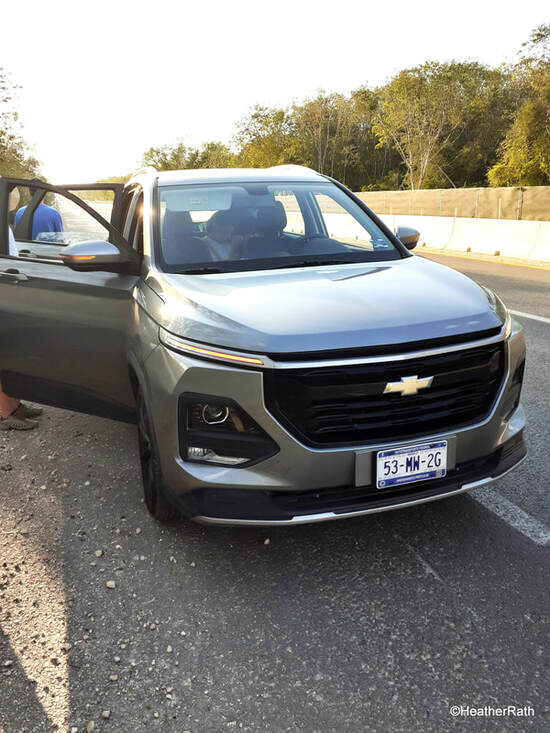
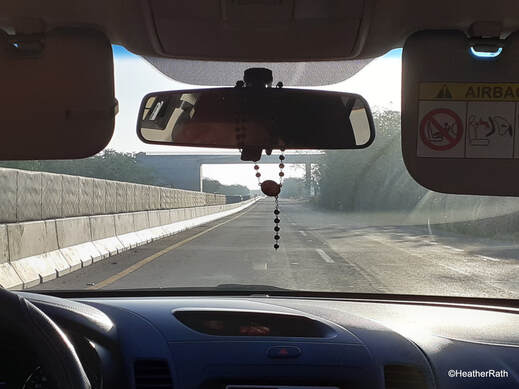
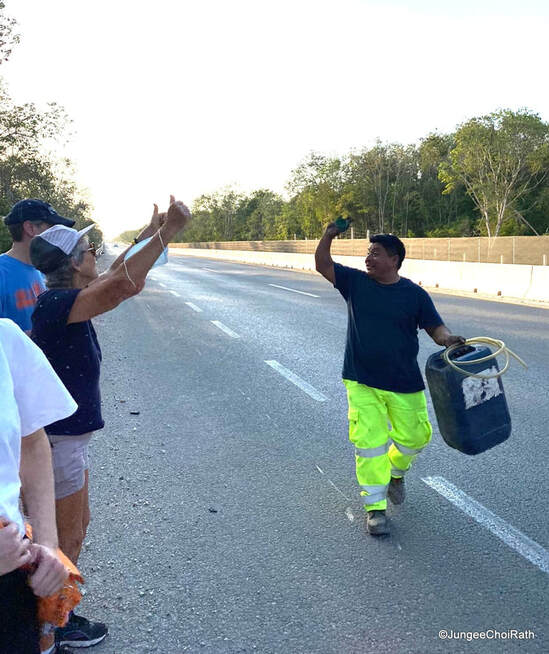
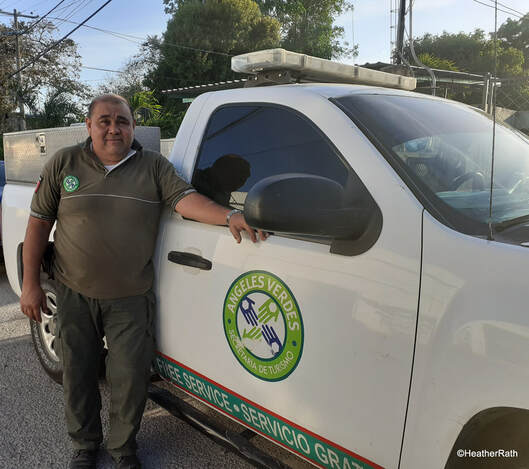
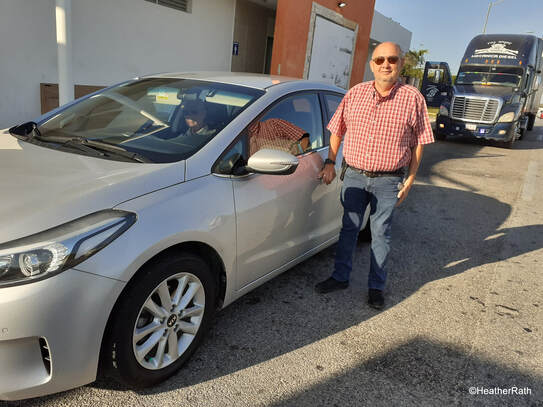
 RSS Feed
RSS Feed